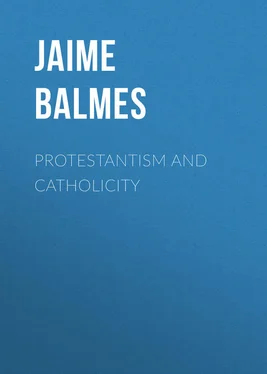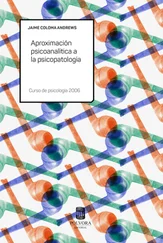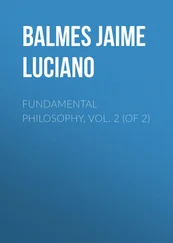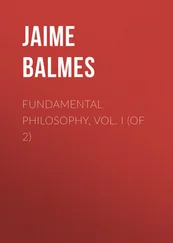Jaime Balmes - Protestantism and Catholicity
Здесь есть возможность читать онлайн «Jaime Balmes - Protestantism and Catholicity» — ознакомительный отрывок электронной книги совершенно бесплатно, а после прочтения отрывка купить полную версию. В некоторых случаях можно слушать аудио, скачать через торрент в формате fb2 и присутствует краткое содержание. Жанр: foreign_antique, foreign_prose, на английском языке. Описание произведения, (предисловие) а так же отзывы посетителей доступны на портале библиотеки ЛибКат.
- Название:Protestantism and Catholicity
- Автор:
- Жанр:
- Год:неизвестен
- ISBN:нет данных
- Рейтинг книги:3 / 5. Голосов: 1
-
Избранное:Добавить в избранное
- Отзывы:
-
Ваша оценка:
- 60
- 1
- 2
- 3
- 4
- 5
Protestantism and Catholicity: краткое содержание, описание и аннотация
Предлагаем к чтению аннотацию, описание, краткое содержание или предисловие (зависит от того, что написал сам автор книги «Protestantism and Catholicity»). Если вы не нашли необходимую информацию о книге — напишите в комментариях, мы постараемся отыскать её.
Protestantism and Catholicity — читать онлайн ознакомительный отрывок
Ниже представлен текст книги, разбитый по страницам. Система сохранения места последней прочитанной страницы, позволяет с удобством читать онлайн бесплатно книгу «Protestantism and Catholicity», без необходимости каждый раз заново искать на чём Вы остановились. Поставьте закладку, и сможете в любой момент перейти на страницу, на которой закончили чтение.
Интервал:
Закладка:
Atheism was bathing France in a sea of tears and blood; an unknown man silently traverses the ocean. While the violence of the tempest rends the sails of his vessel, he listens attentively to the hurricane – he is lost in the contemplation of the majesty of the heavens. Wandering in the solitudes of America, he asks of the wonders of creation the name of their Author; the thunder on the confines of the desert, the low murmuring of the forests, and the beauties of nature answer him with canticles of love and harmony. The view of a solitary cross reveals to him mysterious secrets; the traces of an unknown missionary awaken important recollections which connect the new world with the old; a monument in ruins, the hut of a savage, excite in his mind thoughts which penetrate to the foundations of society and to the heart of man. Intoxicated with these spectacles, his mind full of sublime conceptions, and his heart inundated with the charms of so much beauty, this man returns to his native soil. What does he find there? The bloody traces of Atheism; the ruins and ashes of ancient temples devoured by the flames or destroyed by violence; the remains of a multitude of innocent victims, buried in the graves which formerly afforded an asylum to persecuted Christians. He observes, however, that something is in agitation; he sees that religion is about to redescend upon France, like consolation upon the unfortunate, or the breath of life upon a corpse. From that moment he hears on all sides a concert of celestial harmony; the inspirations of meditation and solitude revive and ferment in his great soul; transported out of himself, and ravished into ecstasy, he sings with a tongue of fire the glories of religion, he reveals the delicacy and beauty of the relations between religion and nature, and in surpassing language he points out to astonished men the mysterious golden chain which connects the heavens and the earth. That man was Chateaubriand.
It must, however, be confessed, that the confusion which has been introduced into ideas cannot be corrected in a short time, and that it is not easy to eradicate the deep traces of the ravages of irreligion. Men's minds, it is true, are tired of the irreligious system; society, which had lost its balance, is generally ill at ease; the family feels its ties relaxed, and individuals sigh after a ray of light, a drop of hope and consolation. But where shall the world find the remedy which is wanting? Will it follow the best road – the only road? Will it re-enter the fold of the Catholic Church? Alas! God alone knows the secrets of the future; He alone has clearly unfolded before His eyes the great events which are no doubt awaiting humanity. He alone knows what will be the result of that activity, of that energy, which again urges men to the examination of great political and religious questions; and He alone knows what, to future generations, will be the result of the triumphs obtained by religion, in the fine arts, in literature, in science, in politics, in all the operations carried on by the human mind.
As to us, carried away as we are by the rapid and precipitate course of revolution, hardly have we time to cast a fleeting glance upon the chaos in which our country is involved. What can we confidently predict? All that we can be sure of is, that we are in an age of disquietude, of agitation, of transition; that the multiplied examples and warnings of so many disappointed expectations, the fruits of fearful revolutions and unheard-of catastrophes, have everywhere thrown discredit upon irreligious and disorganizing doctrines, without having established the legitimate empire of true religion. Hearts sick of so many misfortunes are willingly open to hope; but minds are in a state of great uncertainty as to the future: perhaps they even anticipate a new series of calamities. Owing to revolutions, to the efforts of industry, to the activity and extension of commerce, to the progress and prodigious diffusion of printing, to scientific discoveries, to the ease, rapidity, and universality of communication, to the taste for travelling, to the dissolving action of Protestantism, of incredulity, and skepticism, the human mind certainly now presents one of the most singular phases of its history. Reason, imagination, and the heart are in a state of agitation, of movement, and of extraordinary development, and show us at the same time the most singular contrasts, the most ridiculous extravagances, and the most absurd contradictions. Observe the sciences, and you will no longer find those lengthened labors, that indefatigable patience, that calm and tranquil progress, which characterized these studies at other epochs; but you will find there a spirit of observation, and a tendency to place questions in that transcendental point of view where may be discovered the relations subsisting between them, the ties by which they are connected, and the way in which they throw light upon each other. Questions of religion, of politics, of legislation, of morals, of government, are all mingled, stand prominently forward, and give to the horizon of science a grandeur and immensity which it did not previously possess. This progress, this confusion, this chaos, if you like to call it so, is a fact which must be taken into account in studying the spirit of the age, in examining the religious condition of the time; for it is not the work of a single man, or the effect of accident; it is the result of a multitude of causes, the fruit of a great number of facts; it is an expression of the present state of intelligence; a symptom of strength and disease, an announcement of change and of transition, perhaps a sign of consolation, perhaps a presage of misfortune. And who has not observed the fertility of imagination and unbounded reach of thought in that literature, so various, so irregular, and so vague, but at the same time so rich in fine images, in delicate feeling, and in bold and generous thought? You may talk as much as you please of the debasement of science, of the falling off in study. You may speak in a tone of derision of the lights of the age , and turn with regret to ages more studious and more learned; there will be some exaggeration, truth and error, in all this, as there always is in declamation of this kind; but whatever may be the degree of utility belonging to the present labors of the human mind, never, perhaps, was there a time when it displayed more activity and energy, never was it agitated by a movement so general, so lively, so various, and never, perhaps, did it desire, with a more excusable curiosity and impatience, to raise a part of the veil which covers the boundless future. What will be able to govern elements so powerful and so opposite? What can calm this tempestuous sea? What will give the union, the connection, the consistency necessary to form, out of these repulsive and discordant elements, a whole compact and capable of resisting the action of time? Will this be done by Protestantism, with its fundamental principle which establishes and diffuses and sanctions the dissolving principle of private interpretation in matters of religion, and realizes this unhappy notion by circulating among all classes of society copies of the Bible?
Nations numerous, proud of their power, vain of their knowledge, rendered dissipated by pleasure, refined by luxury, continually exposed to the powerful influence of the press, and possessing means of communication which would have appeared fabulous to their ancestors; nations in whom all the violent passions have an object, all intrigues an existence, all corruptions a veil, all crimes a title, all errors an advocate, all interests a support; nations which, warned and deceived, still vacillate in a state of dreadful uncertainty between truth and falsehood; sometimes looking at the torch of truth as if they meant to be guided by its light, and then again seduced by an ignis fatuus ; sometimes making an effort to rule the storm, and then abandoning themselves to its violence; modern nations show us a picture as extraordinary as it is interesting, where hopes, fears, prognostics, and conjectures have free scope, and nobody can pretend to predict with accuracy, and the wise man must await in silence the dénouement marked out in the secret decrees of God, where alone are clearly written the events of all time, and the future destinies of men.
Читать дальшеИнтервал:
Закладка:
Похожие книги на «Protestantism and Catholicity»
Представляем Вашему вниманию похожие книги на «Protestantism and Catholicity» списком для выбора. Мы отобрали схожую по названию и смыслу литературу в надежде предоставить читателям больше вариантов отыскать новые, интересные, ещё непрочитанные произведения.
Обсуждение, отзывы о книге «Protestantism and Catholicity» и просто собственные мнения читателей. Оставьте ваши комментарии, напишите, что Вы думаете о произведении, его смысле или главных героях. Укажите что конкретно понравилось, а что нет, и почему Вы так считаете.












